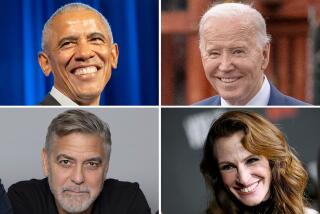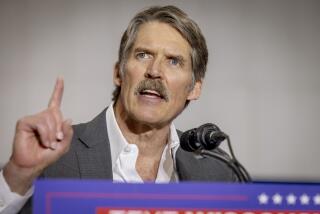California vintner John Jordan wants to shape politics -- on his terms

John Jordan’s Jordan Winery near Healdsburg in Sonoma County has hosted several GOP fundraisers.
- Share via
Reporting from HEALDSBURG, Calif. — John Jordan got his first taste of politics when he ran for vice president of his fifth-grade class.
He wasn’t the most popular kid in class. He wasn’t even aware of the cliques that favored his rivals. He lost.
“I was two votes short, out of 27,” said Jordan, in an interview at Jordan Winery’s ivy-covered, mustard-colored chateau. “Not that I’m keeping score.”
He lost again in 1998 when he ran for the California Senate.
Despite those failures, his interest in politics never waned, and the lawyer turned vintner wrote increasingly large checks to Republican candidates and causes — including six-figure donations to groups supporting 2012 nominee Mitt Romney. But he grew wary of letting political operatives decide how to spend his money without any accountability.
SIGN UP for the free Essential Politics newsletter >>
“Most donors are content to write the check, get their picture taken, listen to the speech and eat the rubber chicken,” said Jordan, 43. “You ask these questions … and you get a lot of dirty looks.”
Jordan, like an emerging group of donors, wanted more control. So he decided to eliminate the middle man and set out on his own two years ago to choose the targets he wanted to help. He developed strategies and crafted the messaging, down to the content of the ads.
Jordan followed a model set by the Koch brothers and Tom Steyer, though he has a fraction of their wealth. Still, in the 2014 cycle, the multimillionaire was among the nation’s top 25 donors to groups not tied directly to a candidate or political party, according to the Center for Responsive Politics.
Earier this month, Jordan made his first independent move in the 2016 presidential election, airing 60-second ads during the fourth Republican debate touting Sen. Marco Rubio of Florida as the GOP’s best bet to take on Democratic front-runner Hillary Clinton.
The television and online ads cost more than $100,000 and were funded by a super PAC that Jordan created called Baby Got PAC. The name is a homage to a 1990s hip-hop song celebrating the size of women’s derrieres.
For Jordan, the wordplay reflects his singular approach to politics and life — fun-loving, scornful of political correctness and disdainful of doing the same thing, or following the same strategy, because that’s how it has always been done.
::
Jordan was born in Colorado in 1972, on the same day his parents signed the deed to the first parcel of the Sonoma County property that would become a major focus of his life: a 1,200-acre vineyard studded with neat rows of Cabernet Sauvignon and Chardonnay grape vines, stands of magnolia trees and native-grass pastures the same straw color as Jordan’s wispy hair.
He spent his childhood bouncing from his grandparents’ home in Colorado to boarding school and to the bucolic vineyard. Jordan fished for bass in a small lake at the winery and learned German and Russian from his nannies, languages that proved valuable in his business dealings.
His parents were Republicans, but his views — fiscally conservative, socially liberal, prioritizing national security — were formed later in life.
Jordan graduated from Occidental College in 1995 with a degree in economics. When he made his California state Senate run in his left-leaning wine country district, he hoped he would benefit from the opposition party’s historic likelihood of success during midterm elections in a president’s second term.
In 2000, Jordan joined the Naval Reserves and remains active. “It’s the only place I could go where someone would call me sir without adding, ‘you’re making a scene, please leave,’” he joked.
After earning a law degree in 2002 at the Empire College School of Law in Santa Rosa, Jordan worked as a civil litigator until he took over day-to-day operations at the winery in 2005. He brought the same ethos to the vineyard that he is now applying to politics. Rather than relying on reviews from experts — in this case, wine critics — Jordan sought to engage consumers directly. He opened the property to visitors and developed eye-popping marketing strategies.
The most infamous is an online video that is a play on Robin Thicke’s hit “Blurred Lines” and pokes fun at stuffy wine connoisseurs. Jordan thrusts a double magnum of wine at women in skin-tight dresses while mouthing “I know you want it,” is hand-fed grapes and cavorts with bikini-clad women in a hot tub.
The tactics have been successful: In 2014, Jordan Winery was named Wine Enthusiasts’ American Winery of the Year and the nation’s most popular restaurant wine by Wine & Spirits magazine.
Serving in the military, working as a lawyer and then operating the winery, Jordan’s political views sharpened. He grew tired of what he viewed as out-of-control government regulation, such as dictating where his vineyard could and could not ship wine. He accelerated his contributions to candidates, wrote articles for conservative media outlets and appeared on radio shows.
But perhaps his greatest influence was connecting deep-pocketed donors and politicians at his vineyard.
In June, Jordan hosted a dinner for Scott Walker, the candidate he was backing in the GOP presidential primary until he dropped out. About three dozen donors capable of writing seven-figure checks flew in from across the country to dine on squab and chat with the Wisconsin governor.
Jordan has also held events at the vineyard for former House Speaker John Boehner, New Mexico Gov. Susana Martinez and former Texas Gov. Rick Perry. The gatherings have become legendary as the antithesis of stuffy political dinners.
Perhaps that is because Jordan is in some ways an overgrown teenager. “Star Wars” lightsabers lie in one corner of the entry. A replica of R2-D2 sits on the mantle in the living room of his vineyard house. A framed animation cell from “The Simpsons” hangs on a wall.
He watches marathons of that cartoon series as well as “Family Guy” and “King of the Hill,” interspersed with political-junkie news shows. He goes to bed reading reams of polling on his iPad, and in the morning he consumes political news for more than an hour before heading to work, where he is trailed by two rescue dogs named Rosie and Bismark.
::
Jordan’s independent ventures in politics have so far resulted in unsuccessful campaigns for long-shot candidates and an anti-Obama dating-themed ad.
The first candidate he devoted time and money to was Gabriel E. Gomez, a former Navy SEAL who ran in a special 2013 election for the U.S. Senate seat from Massachusetts being vacated by now Secretary of State John F. Kerry.
Jordan, who speaks of not leaving a fellow sailor behind, was dismayed by the lack of financial support from national Republican groups. He thought Republican Scott Brown’s 2010 Senate win in a Massachusetts special election offered a sliver of hope for Gomez in the Democratic-leaning state.
“Sure it was an uphill battle, but someone had to go help him,” Jordan said.
“I saw ‘Back to the Future.’ If lightning can hit the clock tower, you get your 1.21 jigawatts … ,” he said, breaking up in a deep-throated laugh. “So you think it’s an uphill battle, but it’s possible. Scott Brown proved it’s possible, and what a way to set the tone going into the 2014 cycle if we can pull this off.”
In the final weeks of the election, Jordan spent $1.4 million on ads touting Gomez. The candidate lost by 10 percentage points, but his supporters, who had previously never heard of Jordan, were grateful.
“I give him credit for having the courage and the guts to go where the establishment GOP groups refused to tread. Gomez was massively outspent in that Senate race, so every little bit helped,” said Eric Fehrnstrom, who ran a pro-Gomez super PAC that aired ads during the primary but ran out of money in the general.
Jordan embarked on a similar effort in 2014 on behalf of Elan Carr, who unsuccessfully ran for the Los Angeles-area congressional seat being vacated by Rep. Henry Waxman.
Some of Jordan’s endeavors have caused controversy, such as a 2014 Web ad that compared female voters’ relationship with President Obama to a bad romance. Liberals pointed at the dating-themed ad as sexist; a prominent female GOP operative dismissed it as further proof that her party’s ad makers didn’t understand women. Still, it was among the most viewed Web videos of the midterm elections.
“He’s kind of an agent provocateur,” said Tracey Buck-Walsh, a former special assistant attorney general in Sacramento who has known Jordan for more than two decades.
The big question is how far he plans to go in 2016. He doesn’t know yet, he said, but he isn’t done.
“If you look at the history of my involvement in different things, I look for a gap or a hole or something that isn’t getting done, and I immediately fill it,” Jordan said. “I’m not someone who sits and says, ‘Well, I’m going to do this 10 months from now.’ I have no idea what I’m going to do 10 months from now.”
For the latest 2016 campaign news, follow @LATSeema on Twitter.
ALSO
Political ad spending estimated at $6 billion in 2016
How California’s congressional delegation lines up on Syrian refugee question
More to Read
Get the L.A. Times Politics newsletter
Deeply reported insights into legislation, politics and policy from Sacramento, Washington and beyond. In your inbox three times per week.
You may occasionally receive promotional content from the Los Angeles Times.











